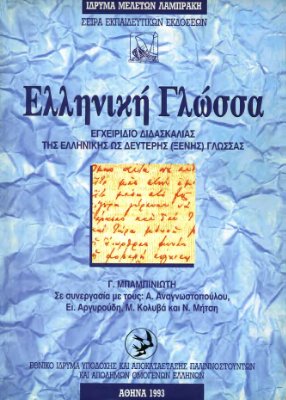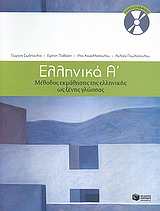Dear Greeks! You asked - we did :) Or rather, not us, but our friends from the most comfortable community for students Greek VKontakte Let's speak Greek! Μιλάμε Ελληνικά! Thank you very much Yuliana Masimova for this article.
Pronunciation
- Basic phonetics course using Rytova’s textbook http://www.topcyprus.net/greek/phonetics/phonetics-of-the-greek-language.html
- Description of phonetics http://www.omniglot.com/writing/greek.htm
- Details and features of Greek pronunciation with detailed tables and examples that you can listen to online (page on English): http://www.foundalis.com/lan/grphdetl.htm
Grammar
6. View all forms of any word, find the initial form of the verb: http://www.neurolingo.gr/el/online_tools/lexiscope.htm
7. Portal Lexigram: dictionary of declension and conjugation of words http://www.lexigram.gr/lex/newg/#Hist0
8. Verbs and their forms, translation into English. language http://moderngreekverbs.com/contents.html
Textbooks
9. Textbooks and others teaching aids in Pdf format, registration is required on the site, then you can download books for free (100 points are allocated, one book costs about 2-3 points, points can be replenished in the future): http://www.twirpx.com/search/
- For beginners (level A1 and A2): Ελληνικά τώρα 1+1. There is audio for it.
- Level A1 and A2 - Επικοινωνήστε ελληνικά 1 - Communicate in Greek, audio and workbook with grammar exercises separately. This is a fun textbook with funny cartoons and excellent development tasks colloquial speech. It has a part 2 - for levels B1-B2
- For levels C1-C2 - Καλεϊδοσκόπιο Γ1, Γ2 (here you can only download samples http://www.hcc.edu.gr/el/news/1-latest-news/291-kalei..
- For levels A1-B2 (released before classification by levels): Ελληνική γλώσσα Γ. Μπαμπινιώτη and Νέα Ελληνικά γα ξένους, it has all the audio
- Textbook in Russian: A.B. Borisova Greek without a tutor (levels A1-B2)
- textbook Ελληνική γλώσσα Γ. Μπαμπινιώτη - there are the most best tables in grammar and syntax (although it is entirely in Greek). Anastasia Magazova steals texts
Podcasts
10. Excellent audio podcasts with transcripts in Pdf and downloadable. The language level gradually becomes more complex: http://www.hau.gr/?i=learning.en.podcasts-in-greek
Radio online
Audiobooks
Dictionaries and phrase books
17. Russian-Greek Dictionary http://new_greek_russian.academic.ru
18. Online Greek-English dictionary with voiceover http://www.dictionarist.com/greek
Video tutorials
19. Greek on BBC - video lessons http://www.bbc.co.uk/languages/greek/guide/
Youtube channels
20. Video lessons Greek from scratch. You need to listen and repeat ready-made phrases in Greek. Subject: everyday communication, cafe, restaurant https://www.youtube.com/watch?v=irvJ-ZWp5YA
21. Greek from the project Speak Asap – Greek in 7 lessons. Vocabulary, grammar at level A1. https://www.youtube.com/watch?v=Hm65v4IPsl8
22. Video project Greek-for-you https://www.youtube.com/watch?v=x5WtE8WrpLY
23. Easy Greek channel – from level A2 https://www.youtube.com/watch?v=gtmBaIKw5P4
24. Audiobooks in Greek: http://www.youtube.com/playlist?list=PLvev7gYFGSavD8P6xqa4Ip2HiUh3P7r5K
25. Channel with educational videos on the Greek language for elementary students Greek school https://www.youtube.com/channel/UCnUUoWRBIEcCkST59d4JPmg
Movies
Books
30. The open library includes copyright-free works of classical literature, as well as contemporary works posted by the authors themselves. All books on the Open Literature list are distributed freely and legally. http://www.openbook.gr/2011/10/anoikth-bibliothhkh.html
31. Free e-books http://www.ebooks4greeks.gr/δωρεανελληνικα-ηλεκτρονικαβιβλια-free-ebooks
32. Interactive textbooks for Greek high school by grade and subject - suitable for students of Greek as a foreign language at levels B1-B2.
For children
34. Little reader: audio books for childrenhttp://www.mikrosanagnostis.gr/istoria.asp
35. Games for children: initial level of language learning. To log in you must enter your name.http://ts.sch.gr/repo/online-packages/dim-glossa-a-b/start.html
Exams and tests
37. Portal of the Greek Language Center, which conducts, in particular, exams for CERTIFICATION OF KNOWLEDGE OF THE GREEK LANGUAGE. Here you can:
— Determine your level of Greek language proficiency
— Find exam centers for the Greek Language Certificate (required for studying and working in Greece)
— Download materials to prepare for the Certificate exams
Various sites
38. A site with a variety of information about the Greek language, many links to resources:
- No, I will never learn this language! – I thought, the first time I heard fast, full of energy and expression Greek speech. And she refuted herself after 6 months, speaking Greek the way others speak after 2-3 years of intensive study. Did I have a special technique? It seemed to me then that I did not follow any methodology at all, but today, 20 years later, I still admit that if you collect the scattered pieces of the puzzle, you can create a methodology from them, the copyrights of which belong to Life. So, take note for students of Greek:
➡ Principle one: first learn to speak, and then write. Of course, we are not talking about not writing at all, but about the alphabet and spelling of the language being studied. I wrote down Greek words by ear in Russian letters in a notebook, which was with me everywhere and always, and in the evening I read my own dictionary. Later I began to write down entire expressions, mainly questions and answer options. The first principle flows smoothly into
➡ IN second:pay attention to those words and try to remember them that YOU need. This is what programmers and webmasters do, who need professional vocabulary like air to do their work. Do you believe that you can not know the name of a fork and a spoon, but be able to read a history textbook? Believe. It's rare, but true story a girl I know who moved to Greece and entered the lyceum. Spoon and fork can be learned in the school cafeteria, but “the Renaissance” and “Greek liberation movement” are unlikely.
➡ Principle three: elimination of the “extra link”. Typically, learning vocabulary is a chain of three links: a word - a translation into Russian - an image. When we read the word “νερό” (water), our imagination pictures either a glass of water, or water flowing from a tap, or a river or other body of water - this is the image. It is enough to read the translation once, then this is an extra link, i.e. the word in Russian must be excluded from the chain. As a result, we get “νερό” = image (a glass of water, for example). In this way, we avoid the main obstacle to rapid vocabulary acquisition - involuntary translation into Russian. This is exactly how foreign languages are taught to children who cannot yet read native language- word and picture. And the results are impressive.
➡ Fourth: sl listen, listen, listen. Pronunciation, melody, intonation, stress... Listen and repeat as close to the original as possible. In Greek, all unstressed vowels are read exactly the same as stressed vowels. When I hear our compatriots say "AND fharisto p A whether" instead of " E fharisto p Oli" (thank you very much), I understand that they could not hear it anywhere. This was read, and read “in the Russian way,” where the unstressed O is pronounced like A. You can listen not only to educational audio materials, but also to songs, Greek radio, and even better, live speech.
➡ Principle five: I'm Greek! Getting into the role is half the battle done. What in common parlance we call manner, in our case, manner of speaking, is not only making sounds. Gestures, facial expressions, the same melody of speech... What kind of Greeks are they? Lively, emotional, maybe even unrestrained, by our standards. And all this is reflected in speech. You cannot, if I may say so, mumble, swallow sounds, lower the tone at the end of a word or sentence, and chew on endings. Speech is richer, more energetic, sounds are clear, speech organs are under greater tension. And, of course, indescribable gestures! It’s worth a look here - it’s a treasure trove useful information!
➡ Principle six: Talk, talk, talk. With mistakes, incorrectly, stumbling, helping oneself with gestures. You will be understood and appreciated for your work, rest assured. Don't wait until you are confident that you know everything and say it correctly. The Greeks are a small nation and any attempt by foreigners to communicate in Greek is received very warmly by them. Ask for your mistakes to be corrected so you don't have to remember the wrong forms. If you have Greek friends, try to exclude an intermediary language, such as English.
I wish you all success! Please share your experience of learning Greek in the comments.
Irina Poturidi
P.S. Are you interested not only in life in Greece, but would you also like to understand and speak Greek? Great solution! After all, you can learn a lot about the mentality and life of a country, but without understanding its language, you will never understand its inhabitants. Our website is not only articles and stories about different countries, but also specific assistance in mastering the language in the fastest and most easy technique. There are no coincidences in life. Perhaps you ended up with us not by chance.
P.P.S. We have great news. A karaoke bar has opened on our YouTube channel. English videos of songs and karaoke are already ready. Greek through songs and karaoke is also about to appear. Subscribe to the channel and follow the emergence of the Greek language, as well as the surprises that we are preparing for you.
What do you need to know about Greek for beginners? What difficulties await tourists who decide to learn a few things before traveling? Greek words or phrases? What is the best way to learn Greek, is it easy to do on your own?
These and other questions that are of interest to everyone who is starting to learn Greek from scratch can be found below in the article.
Learn Greek for tourists - is it worth doing and why?
QUESTION: Is it worth learning Greek for tourists?
ANSWER: Yes, it is worth it, and even for several reasons, which we will discuss below, but for now let’s figure out where they speak Greek.
 So, Greek is the official state language of Greece and one of the official languages of Cyprus.
So, Greek is the official state language of Greece and one of the official languages of Cyprus.
But you also need to know that quite large communities - communities of Greeks also live in the USA, Great Britain, Australia, Germany, Canada, Chile, South Africa, Bulgaria, Turkey and even Russia.
Greek is spoken by about 15 million people all over the world, therefore, having learned it, you, as a tourist, can not only feel free while traveling in Greece or Cyprus, but also -

Is Greek difficult?
Many of those who are just planning to learn Greek from scratch or still doubt whether they can master this path are wondering whether the Greek language is difficult, how difficult it will be for a Russian person to master it.
It is quite difficult to answer this question unambiguously - after all, Greek has no analogues, since it belongs to a separate branch of the Indo-European languages, therefore for a Russian person it is both easy and difficult at the same time.
Greek easy language for us in terms of pronunciation and learning to read.
 Greek alphabet at first glance it may resemble a mixture of Cyrillic alphabet, Latin alphabet and some other “icons”.
Greek alphabet at first glance it may resemble a mixture of Cyrillic alphabet, Latin alphabet and some other “icons”.
Therefore, beginners are faced with a certain difficulty in learning individual letters, which are very similar to well-known Russian or Latin ones.
At first, students confuse pronunciation and spelling similar to Latin letters in the Greek alphabet, but after a couple of lessons this confusion disappears, and students can read Greek calmly and correctly already in the second or third lesson.
It will also be easy for a Russian person in the sense that in the Byzantine era, the Russian language borrowed many Greek words.
We use many of them in everyday life, most often in compound words -

Planet, alphabet, verse, metal, bed, therapist, cinema, theater, sail, ship, lamp, icon, angel, apostle, philosophy, notebook - these are purely Greek words.
Not to mention the Greek names that our Russian people bear -
- Peter,
- Fedor,
- Evgeniy,
- Irina,
- Galina,
- Alexander, etc.
Greek is difficult for a Russian person in terms of spelling and grammar.

As for spelling, you will have to memorize the spelling of many Greek words, otherwise it simply won’t work, since it is practically impossible to explain and follow the logic of why they are written this way.
The grammar is also quite complex:
- pronouns,
- 3 kinds of nouns,
- difficult to conjugate verb "to be"
- various conjugations of other verbs,
- presence of cases of nouns, etc. - Learning Greek on your own will be very difficult.
However, do not be afraid - under the guidance of an experienced specialist teacher, learning Greek from scratch will be much simpler and easier than it might seem at first glance.
Is it difficult to learn Greek from scratch on your own and how to do it
Most often, tourists and travelers begin to learn Greek from scratch - those who often travel to Greece, Cyprus, for work or on vacation.
Is it difficult for tourists to learn Greek? This is the most common query on the Internet.
Many people who need spoken Greek for tourists try to learn it on their own.

Let us note right away that to teach ancient greek language It is even more difficult than the modern one - colloquial, and it is required only by students in narrow specialties, or those associated with church affairs, so we do not consider how to learn ancient Greek in this article.
So, there are several options for tourists to learn Greek. Below we will look at the most common methods and try to figure out whether they can help.
Option one - phrasebooks
The first thing that comes to a tourist’s mind is to buy a good phrasebook and try to learn Greek for beginners using it.
And what? Memorize a dozen necessary phrases, which are written in Russian letters, and hope that they will be useful on the trip unchanged.
And the Greeks will answer your memorized questions with exactly the same answer phrases that are given as examples in the best and most expensive phrase book that you purchased in a bookstore.
That would be ideal, of course. But that doesn't happen!

People are living people, they all think differently, and it is difficult to predict the answers.
- And what to do if they don’t understand you?
- What if the conversation didn't go according to pattern?
- What if you have learned or applied phrases incorrectly?
- Or are you pronouncing Greek words incorrectly?
QUESTION: Is it possible to learn Greek for tourists using a phrasebook?
ANSWER: Learning Greek for tourists from a phrasebook is obviously a losing option.
Yes, from the phrasebook you can learn -
- greet,
- say goodbye
- thank,
- answer questions about your name and where you came from,
- can memorize the names of YOUR favorite dishes in order to order them in a restaurant or cafe,
- You can learn some basic words.
But just communicating, maintaining a conversation, correctly answering the Greeks’ questions, understanding what exactly they want from you - not a single phrase book can help with this. 
Option two - textbooks
The next way would be to try to acquire modern textbooks, tutorials, dictionaries and rely on your perseverance and try to learn Greek for beginners yourself from the basics, gradually understanding the intricacies and complexities from books. 

There are other textbooks, both Russian and Greek editions; we have listed only those that, according to student reviews, are considered the best, most sensible and quite modern.
In a separate article we have provided a more comprehensive list of resources for learning Greek.
QUESTION: Is it easy to learn Greek for tourists using textbooks on your own, without help?
ANSWER: Very difficult, but not impossible, of course.
Firstly, spoken Greek is often different from what is taught in textbooks.
Much of what is given in them will not be needed by any tourist either in life or in conversation. Textbooks have a more academic focus, that is, the language is taught there with all the subtleties, complexities and much more fully than a tourist or traveler needs.
Secondly, It is very difficult to learn Greek on your own for beginners without qualified help from a teacher.

Not everyone can organize themselves in such a way as to set aside time every day to study the Greek language, do exercises, learn new words and phrases, read and retell texts, pronounce dialogues, force themselves to speak Greek.
Option three - Greek online
You can try to learn Greek online on your own using Internet resources without spending a penny.
Fortunately, there are now many sites and platforms on the Internet that allow you to learn Greek online on your own.
Below we will list the most popular of them, but let us make a reservation right away that some of them are in English. That is, they are suitable for those who already have an intermediate level of knowledge.

QUESTION: Is it difficult to learn Greek online on your own?
ANSWER: Hard. After all, be that as it may, it’s the same independent work, only textbooks and materials are not paper, but electronic.
Only those who already speak one or more foreign languages and already have experience in self-learning can cope with a new language alone.
In order to learn Greek online on your own, you need enormous willpower, great motivation, self-organization and perseverance.
Learn Greek from scratch online with experts
Above, we have already discussed how you can learn Greek for beginners from scratch on your own and found out that without the help of a knowledgeable specialist, a professional teacher, this is very difficult and difficult to do.

QUESTION: What needs to be done to learn Greek quickly, easily, conveniently and comfortably?
ANSWER: It’s simple - an online Greek tutor will help you - a qualified specialist who -
- Will develop your individual program,
- Will give answers to the most difficult questions,
- Will help and select the best textbook, as well as video and audio materials,
- Explains grammar
- Checks whether you have learned the new material correctly,
- Will correct and correct your mistakes,
- Will guide, support and praise.
STEP 2: After this, our administrators will contact you and schedule a trial lesson at a time convenient for you.
During the trial lesson -
When you move to another country as a child, learning a foreign language is easy, and what was previously a foreign language quickly becomes native. But, if you are already over 18 and do not have any special abilities for languages (and this was exactly the case in my case), then learning a foreign language can be a difficult task, especially if you need to learn Greek...
Today I want to tell you how I learned Greek, perhaps my experience will be useful to someone and help in difficult times (yes, I even threw notebooks, in full confidence that Greek is practically Chinese, and I will never master it).
How it all began.
Moving to Greece was not a spontaneous decision: I knew in advance that, one way or another, I would move to this wonderful country. Therefore, I decided to start preparing for the move by learning Greek. And then a problem arose: I don’t know how it is now, but 7 years ago there were simply no tutors or Greek language courses in Belarus. I had to start learning the language on my own. Among the resources available to me were a few language lessons on the Internet and several Greek textbooks. I wrote about the best books for learning Greek. Is it any wonder that by the time I moved, I had only mastered the alphabet and a few basic grammatical structures.
"Yasu malaka."

My integration into the language environment began at the Athens airport building, where I heard and learned my first two words in Greek. “Native speakers” uttered these words so often that it was a sin not to remember. Can you guess what popular Greek words we are talking about? Of course, “yasu” is a Greek greeting/farewell and “malaka” is (uh, how can I translate it so as not to express it) a curse word. The word “malaka” in Greece has a certain magical, almost sacred meaning.) The Greeks managed to give a completely ordinary meaning to the word, which originally meant a curse, and unanimously use it in the company of friends or at work, to describe emotions or characterize things and events. And no one is offended by anyone. But I would not advise immigrants to use it, at least in the first couple of years.
From the ship to the ball.
Naturally, with knowledge of the alphabet and as many as 2 words in Greek, my path could only lie in group A (for beginners) of the Philosophers School of the University of Athens.
How exactly to study the language: independently or in courses, everyone chooses based on their preferences and capabilities, but I simply vitally needed () a diploma in knowledge of the Greek language, so my choice was predetermined.

During the courses, we were often repeated a phrase, the meaning and correctness of which I understood only some time later: “If you know the grammar of the Greek language, everything else will follow.” At that time, I strongly disagreed with this statement. Years of studying English have taken their toll: they studied and learned grammar at school, but what’s the point? I began to speak and communicate freely in English only when I found myself in a language environment, and there was no one nearby who understood Russian. Here you want it, you don’t want it, you can talk. At school, I, like other guys in the class, could not clearly connect even a few phrases in English, despite the long hours spent “memorizing” the rules of grammar. Therefore, I did not trust the teachers in Greece, and I studied grammar solely because of the grammar test included in the upcoming exam.
As time has shown, the teachers were right. When you are in a language environment (and not outside it, as is the case with school English), knowing the subtleties of grammar helps a lot. Within a year, I spoke Greek better than some foreigners who had lived in Greece for decades. And all because, having even a small vocabulary, but a good grammatical base, I clearly understood the “formula”: how, what and why to say.
A thorny path.
If we talk about the process of learning Greek itself, it was very difficult. The exam time was quickly approaching, and knowledge and skills were accumulating very slowly.

I attended courses five days a week, spent hours in the evenings doing huge homework, and learning words. The clock was ticking, deadlines were pressing, and at some point bad thoughts crept into my head: I’ll never learn “THIS,” I don’t understand anything, and in general, I’m probably a fool, not a very capable student. If you are not pressed for time and there is no certain fixed deadline, day “X”, by which you need to know everything, then learning the Greek language will be much easier and more enjoyable. If there is no time, then you will have to gather all your strength into a fist and “cram” further.
At some point, when my vocabulary expanded significantly, and I already knew grammar like a duck to water, all the pieces of the puzzle came together into a single whole. Everything somehow unexpectedly quickly went easy, very easy. I began to understand spoken language, speak Greek myself, read - all this began to come without difficulty. special effort as something taken for granted. From here I made an important conclusion: the main thing, when you are just starting to study Greek, is to overcome yourself and, regardless of the fact that a lot of things still don’t work out, that you don’t understand something, just continue. And at some point, when the “skeleton of language” is formed in your head, all subsequent knowledge will come on its own, without much effort on your part.
What helped me.
Undoubtedly, being in a language environment makes it much easier to learn a language. But even in Greece, many foreigners manage to drag out this process for decades. I would like to give a few recommendations that helped me and my friends learn Greek faster.
No Russian channels! Especially at the beginning of studying the Greek language, Russian television should be strictly prohibited. I have a friend who lived in Greece for 15 years and can hardly string together 2-3 words in Greek. And if it weren’t for her love for programs and films in Russian, everything could have turned out differently.
Watch Greek TV series and foreign films with subtitles in Greek. For me, this point was one of the most difficult, since I don’t like TV series in general, and even more so Greek ones. But Greek TV series are the key to understanding spoken language, so I had to watch it. If TV series contribute to the development of listening comprehension skills, then films with Greek subtitles will enrich your vocabulary and help you make fewer spelling mistakes when writing.
Greek songs. To be honest, I don’t agree that listening to songs will help you understand spoken language faster. I’ll explain why: in order to hit the notes (and in general the melody requires), the singer is forced to draw out the words somewhere, and “eat” parts of them somewhere. This is acceptable for a song, but not for life. So it turns out that TV series or radio are much more effective. This is just my point of view, many people claim that they learned Greek thanks to songs.

Read. Read as much as possible, try to find the type of literature that you like: it could be Greek myths, children's fairy tales, fiction, fashion magazines and even just signs on the roads. The more you read, the faster your vocabulary will expand.
Ask. Don't be shy to ask what a word you don't know means. Ask your friends to point out your mistakes in speech. The fact is that when a foreigner has at least learned Greek and begins to speak with mistakes, he is corrected, but only for the first half hour. Then the Greeks begin to understand your speech even with mistakes, they get used to understanding you this way, and stop pointing out mistakes. What happens next: making the same mistake 3-4 times, a foreigner begins to think that since he is not corrected, it means that he speaks correctly, and the word with the mistake is “embedded” in his memory as the correct option. It is very difficult to relearn later.
Try to stop communicating in English. I know from my own experience that sometimes this is very difficult to do. Especially when you want to quickly convey your idea to your interlocutor, and vocabulary in Greek there is still not enough. It turns out that saying a phrase in English is much easier and faster than “straining” your brain and fishing out a word in Greek from the bins of your memory. As a result, learning Greek will drag on for an indefinite period.
Be afraid of your wishes, they tend to come true ☀
Modern Greek as a second foreign language has officially entered the curriculum of Russian schools. In Athens, the Russian Minister of Education Olga Vasilyeva and the First Deputy Minister of Education for Scientific Research and Innovation of Greece Kostas Fotakis recently signed an agreement on bilateral cooperation in the educational sphere of Russia and Greece. According to the agreement with from January 1, 2017 Russian schoolchildren, at their own will or at the behest of their parents, will say “milAme hellinika” instead of “sprechen se deutsch” and “parle vous français”. First of all, the choice will affect schoolchildren in the south of Russia, where many ethnic Greeks live. At first academic year Modern Greek will be taught in Russian schools those cities where it is popular.
Undoubtedly, within the framework of the cross year of Russia and Greece, the news will please all philhellenes living in Russia; until recently this could only be a dream. I've been dreaming for 9 years!
Why did I start learning Greek?
“Not Greek, please, God!” I screamed on the beach with my head raised to the sky.
While the 2-euro coin did somersaults in the air, the high waves of the Aegean Sea crashed against the Cretan shore. The red flag loomed before our eyes and dangled under the force of the wind so that it seemed that in another moment the mighty wind would, without regret, carry the scarlet banner into the restless dark blue sea.
There was a "fried" smell in the air. The storm intensified. The clouds were gathering. The sea was shaking. A few minutes before these natural beauties, my friend and I left our room to walk around the hotel grounds. We wandered along the beach in splendid isolation, which is understandable; in such weather a good owner would not kick out his dog. We left without the dog, but with a camera in our hands. Although "wandered along the beach-" to put it strongly, we rather flew, driven by the hellish wind at our backs, like driven bobbies with their tails between their legs, while managing to take photos as we went as a memory of our vacation. My long hair waist-deep, blown by the wind, they walked on their own, every now and then the strands were nailed to their lips, so that involuntarily one could feel the taste of the salty sea in the hair. Everything would be fine, fun, laughter, wind, but an argument ensued between us and at some point it got heated. Clicking her camera and looking at the screen, my friend noted that God himself ordered me to learn Greek with such a Mediterranean appearance, I resisted and chuckled. Yes, I knew the Myths Ancient Greece by heart since childhood, yes, I fell in love with modern Hellas, yes, I began to pronounce the name of the Greek singer Michalis Hadziyannis without errors, but I never wanted to learn an unfamiliar language from scratch, no matter how beautiful it was by ear.
In response to my friend, I retorted “teach yourself, you have someone to develop your talent for learning languages”(my friend’s dad is a translator and speaks 4 languages fluently). She did not calm down, objecting to the fact that the Greeks did not approach her and do not talk "agapimuapopuise". "Certainly,"- I answered, "It would be strange if they addressed a blonde with blue eyes in Greek." Word by word, the dispute flared up in earnest, in the end we decided that knowledge of one additional language would not hinder any of us and it would be useful for each of us to improve our spoken English, which we learned from the first grade, but were at the level of “I understand everything, but to say I can't." It was necessary to decide who would learn Greek and who would continue to learn English.
Oh, miracle! Luck was on our side. Lenka found a single 2-euro coin in her jeans pocket. She threw it so high that I managed to scream several times "just not Greek!" As I remember the moment now, my hidden reverse fell face up into the sand. And this meant only one thing - I got to learn Greek!
My girlfriend grinned contentedly and said in a friendly way “You didn’t have to throw the coin, I told you right away, learn Greek, Greek girl!”
This is how my story of learning Greek began. A dispute is a dispute. I only regretted one thing, why English and German languages They study it in schools, but not Greek? At that time, the Modern Greek language was such a rarity in Russia that the first thing I came across was where to study?
I started learning Greek in courses at the Trade Union Committee of the Diplomatic Academy of the Ministry of Foreign Affairs, and continued to learn again from scratch as a free student at the Department of Byzantine and Modern Greek Philology of the Faculty of Philology of Moscow State University. It was thanks to the efforts of Irina Vitalievna Tresorukova, her talent to teach, and intensive training that I reached new level and the Greek language began to sparkle with bright colors. Those classes, filled with a magical atmosphere, will forever remain in my memory. After all, we studied not only the language, but also the politics, history, culture and modern life of the Greeks.
Of course, I taught myself with the help of books that were bought in countless quantities as soon as they appeared on bookstore shelves. I knew all the shelves with the “Greek language” sign in large bookstores in Moscow by heart!
Living in Athens, I still continue to teach! I think my love affair with Greek will last a lifetime!
Now I can’t imagine myself as a person without knowledge of the Greek language.
Greek language is special...
The Greek language is my life, my destiny, my love!
Useful materials for self-study of Greek
Phonetics
Where do people usually start learning? foreign language? That's right, from the alphabet. The Greek alphabet consists of 24 letters.
Grammar
The only thing is that this grammar textbook is suitable only for those who know Greek well and can read and understand.
Here you can find out more Extended version for advanced(read pdf)
You may find these links useful:
Verbs in alphabetical order, their conjugation forms, translation of the meaning of the word, but in English.
Tutorials
1. Greek for beginners without a tutor. Borisova (download pdf)
My very first Greek language tutorial. All texts, dialogues, expressions, words are applicable to modern life and are often found in the daily life of the Greeks. From this book I learned some poems, proverbs and sayings. I recommend downloading the book from the link and starting studying now!
I found a cool website on the Internet where you can study online using a tutorial, listen to audio recordings and immediately complete the task (check on the spot, the keys are given). Beautifully decorated. I recommend Online Greek lessons
2. Online translator from Greek to Russian or from Russian to Greek (click here)
3. Explanatory dictionary of the Greek language online ( )
4. Babinotis's explanatory dictionary (I have it in my personal archives in djvu format). If anyone needs it, write to me by email, I will definitely forward it.
This dictionary provides interpretations of the meanings of Greek words, even those rarely found. Vital for students, teachers and translators.
5. Modern Greek-Russian dictionary of modern slang and profanity (djvu format)
Greeks are an impulsive people, often expressing themselves “in the heat of the moment.” True, in practice, some of the profanity from this dictionary is outdated, or so they say in remote villages. IN big cities Curiosities are possible with the use of phrases or words from this book. Be careful before you swear in front of a stranger.
Applications
Several years ago, when traveling abroad, it was impossible to do without a phrasebook. Now the phrasebook can be downloaded as an application to your mobile phone and use it when absolutely necessary. Or Google to help!
In the Play Store, I feel like a detective, constantly testing different applications - installing new ones, studying them and... deleting them.
But I’ll share one that stands out in my opinion, which I have been using as a training device for a long time and have no intention of removing.
Learn Greek Vocabulary Free (avatar with the Greek flag and 10,000 words and phrases signed below)
This application is a godsend for students of the Greek language. Firstly, the application has several sections, first there is a choice by level of knowledge: beginner, basic, below average, above average, advanced. Secondly, it is divided into topics of interest: business, travel, everyday life, etc. Thirdly, the learning method: we learn words by ear, visually and in writing. Fourthly, a cumulative effect occurs; after some time, new words are repeated again.



